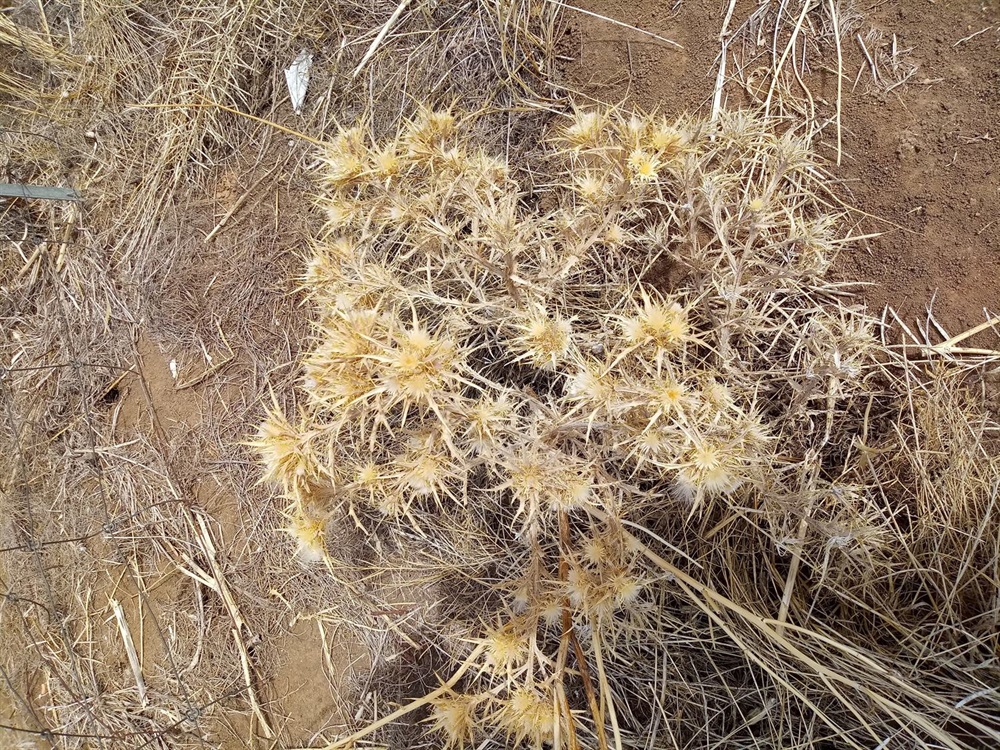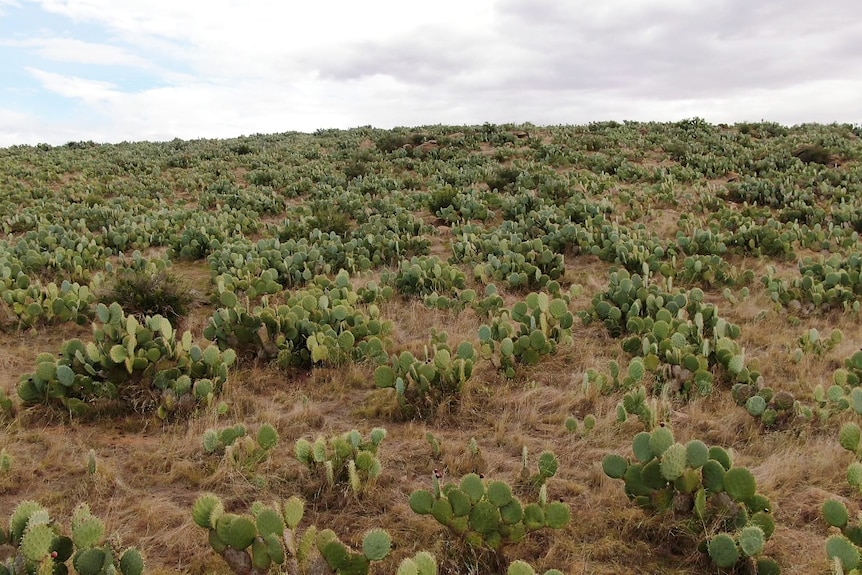Roadside Weed and Pest Control Program
$2.86 million has been allocated for the 2023-24 Roadside Weeds and Pests Program to assist eligible councils responsible for managing lengths of municipal rural roadsides. Northern Grampians Shire Council is one of the regional councils across Victoria that has received funding under the state government’s Roadside Weeds and Pests Management Program to assist in the management of regionally prohibited, controlled, and restricted weeds and pests on rural roadsides.
Our council is responsible for the management of approximately 3,140 km of rural roads throughout our road network and we are dedicated to managing weeds and pest infestations on these rural roadsides. Our key focus is a commitment to early prevention and control of weed species. Rural roads provide an ideal pathway for invasive species to spread across the region, threatening parks, forests, and rural land asset values.
Funding under the state government's Roadside Weeds and Pest Management Program is used for both on-ground works and for the development and implementation of the rural Roadside Pest and Weed Control Plan to benefit all community members, particularly property owners and private land managers with agricultural land bordered by rural roadsides. Our main objective is the effective and proactive management of invasive species across the shire and the region as a whole.
The community is able to report rural roadside weed and rabbit concerns directly to the council either in person, by phone, or through this website.
For further information, please refer to the Northern Grampians Shire Council RWPP Control Plan 2023-2026(PDF, 4MB).
State prohibited weeds
These invasive plants do not occur in Victoria but pose a significant threat if they invade or are present; they can reasonably be expected to be eradicated. If present, infestations of a state-prohibited weed are relatively small.
They are to be eradicated from Victoria if possible or excluded from the state. The Victorian Government is responsible for their eradication, but under Section 70(1) of the Catchment and Land Protection Act 1994, it may direct landowners to prevent their growth and spread.
Regionally prohibited weeds
Regionally prohibited weeds are not widely distributed in a region but are capable of spreading further. It is reasonable to expect that they can be eradicated from a region, and they must be managed with that goal. Landowners, including public authorities responsible for crown land management, must take all reasonable steps to eradicate regionally prohibited weeds on their land.
Regionally controlled weeds
These invasive plants are usually widespread in a region. To prevent their spread, ongoing control measures are required. Landowners have the responsibility to take all reasonable steps to prevent the growth and spread of regionally controlled weeds on their land.
Restricted weeds
This category includes plants that pose an unacceptable risk of spreading in Victoria and are a serious threat to another State or Territory of Australia. Trade in these weeds and their propagules, either as plants, seeds or contaminants in other materials is prohibited.
See Victoria's consolidated list of declared noxious weeds and pest animals.
No spray
Landholders with rural roads adjacent to their property can elect not to have roadside spraying occur alongside their properties. The landholder must complete the following No Spray form to notify the council of your preference:
No Spray form >>
Rabbit control
In Victoria, feral or wild populations of European rabbits (Oryctolagus cuniculus) are declared as established pest animals under the Catchment and Land Protection Act 1994.
Under the Catchment and Land Protection Act 1994, landowners have a responsibility to take all reasonable steps to prevent the spread of, and as far as possible eradicate, established pest animals from their land.
For more information on rabbit control in urban and semi-urban areas, please visit Integrated Rabbit Control.
Soldier Thistle Control Project 2020
The previously absent Soldier Thistle (Picnomon acarna) weed has been identified in the Northern Grampians Shire. This weed is classified as a Regionally Prohibited weed by the North Central Catchment Management Authority (NCCMA) and is a threat to existing natural and agricultural landscapes.
Because of this, the Department of Energy, Environment and Climate Action manages a control program focusing on the Soldier Thistle, with the goal of regional eradication. In order to assist, Northern Grampians Shire Council has added the Soldier Thistle to the Roadside Weed and Pest Program as a target species.
The target areas of the project are Marnoo, Swanwater and Gooroc. Landowners within the target areas have been notified by Agriculture Victoria and are voluntarily complying with their legal obligations prior to Agriculture Victoria Officers undertaking any inspections.
Where upon inspection it is determined that Soldier Thistle control is required, specific advice is provided.

For more information about the Soldier Thistle(PDF, 82KB), visit the Agriculture Victoria website, or contact us.
Wild Wheel Cactus in Regional Victoria
Wheel cactus is also known as Opuntia robusta and is native to Mexico. It is a highly invasive weed that is not classified as a Weed of National Significance. The weed produces viable seed, which can be spread in the droppings of birds, foxes and other animals over large distances. It has been noted that distribution can extend five kilometers a year. The plant reproduces by seed and also propagates from branch segments. Once established, individual wheel cactus plants can live for several decades. Landowners have a legal obligation to eradicate this invasive species from their land. Parks Victoria is currently carrying out control work across the state.

Photo Credit: ABC News (Kyle Harley)
For more information on Cactus Wheel, visit the Agriculture Victoria website, or contact us.
Reporting Roadside Weeds and Pests
In order to efficiently utilise available funding, the council is collecting and mapping information input from contractors, individuals, both Landcare and community groups and 'friends-of' groups. Council encourages any individual or community group with local knowledge relating to weed and/or pest information to contact the council in order to stay informed of current and emerging weed and rabbit issues in the shire.
The following Roadside Weeds and Rabbit Reporting Form is available to report any occurrence of weeds or rabbits in rural areas throughout the shire:
Roadside Weeds and Rabbit Reporting form >>
Weeds at the Early Stage of Invasion (WESI)
Invasive species management, including weed management, is an integral component of any landscape or reserve scale conservation program. The benefits of a preventative and early intervention approach has been adopted in many parts of the world with great success.
The WESI Project was created to promote these benefits and enable Victoria to adopt this approach, with a focus on high-risk invasive weeds that are in the early stage of invasion and threaten biodiversity. We work with public land and biodiversity managers anywhere in Victoria.
Weed management
Weed activities fall into four broad categories: prevention, eradication, containment and asset-based protection.
Better understanding of these different management approaches means that public land managers can make informed decisions, invest resources wisely, and have better biodiversity outcomes.
Weeds at the early stage of invasion (early invader weeds) are plants that have naturalised and started to spread and their eradication is extremely important for the protection of Victoria’s biodiversity.
Eradication is the elimination of every single individual (including propagules e.g. seeds and buds) of a species from a defined area in which recolonisation is unlikely to occur.